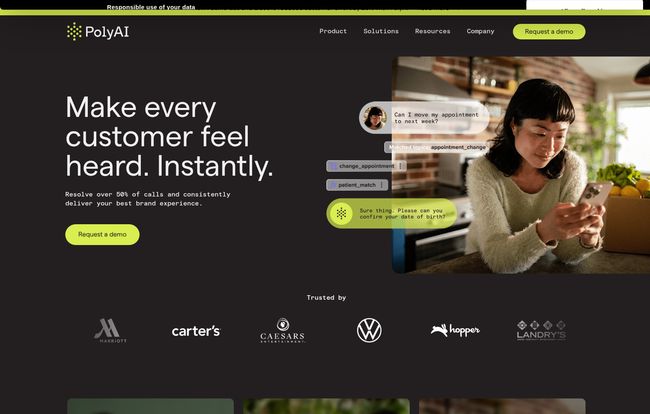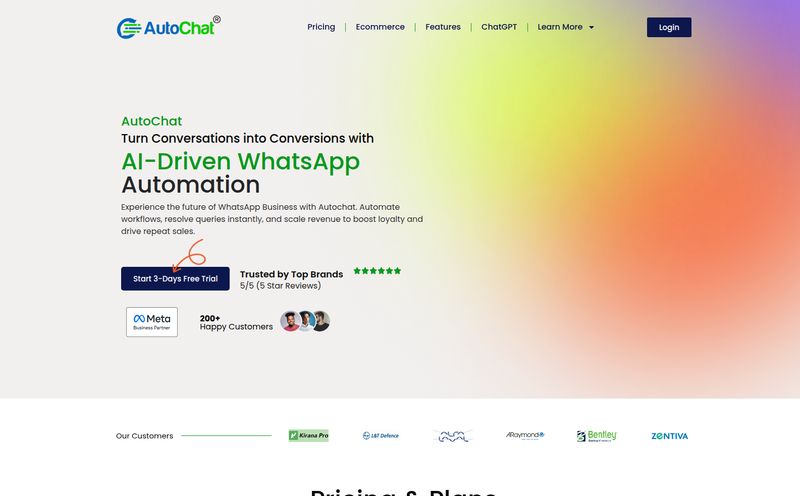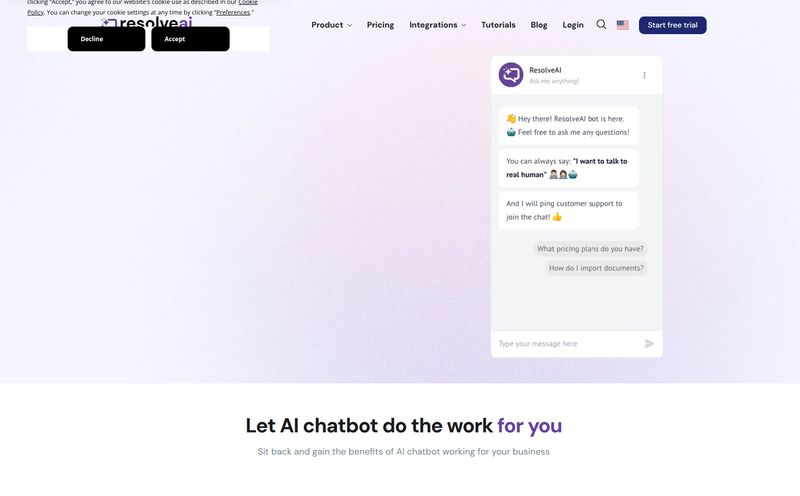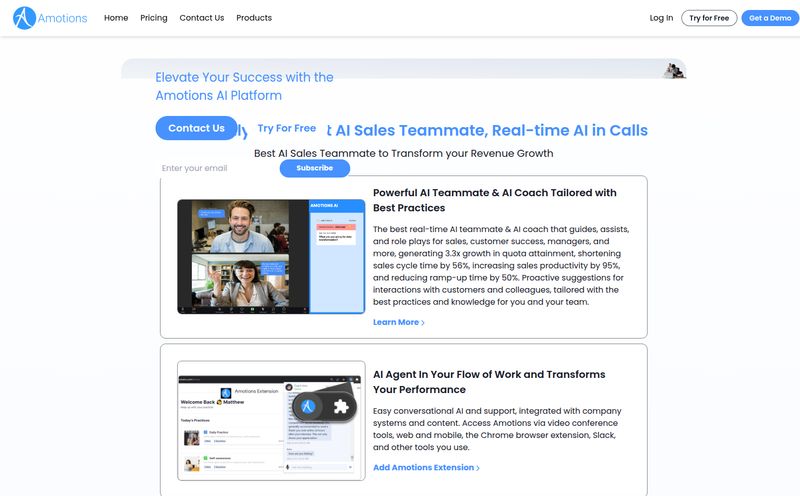There are few things in modern life more universally dreaded than calling a customer service line. You know the drill. You navigate a maze of irrelevant options, listen to 15 minutes of tinny hold music, and then get transferred three times only to have the call drop. It's enough to make you want to throw your phone into the nearest body of water. For years, we've been promised a better way, and for years, we've been let down by robotic, unhelpful automated systems.
But what if that's actually changing? I've been hearing a lot of chatter lately about a company called PolyAI, which claims to have created "superhuman voice assistants." That's a bold claim. As someone who has spent years staring at traffic analytics and CPC trends driven by customer frustration, my curiosity was definitely piqued. Is this just another fancy Interactive Voice Response (IVR) system, or is it something genuinely new? Let's get into it.
So, What is PolyAI, Really?
On the surface, PolyAI offers a platform of lifelike AI voice agents designed to handle customer service calls, 24/7, without a human in sight. Think of it as the next evolution of the automated operator. But instead of the stilted "Press one for sales... Press two for support..." experience, PolyAI aims for natural, customer-led conversations. The goal is for the caller to state their problem in their own words, and for the AI to understand and resolve it. It's less like talking to a machine and more like talking to a hyper-efficient intern who’s had way too much coffee and never needs a bathroom break.
It's built for enterprise-level operations—we're talking big players in healthcare, retail, finance, and travel. The kind of companies that field thousands of calls a day and where every minute of hold time costs money and chips away at customer goodwill.
The End of "Your Call is Important to Us"?
PolyAI's whole pitch, summed up in their snappy tagline "Hold times are for the old times," is music to my ears. The core promise is to solve the biggest headaches for both businesses and their customers. From a business perspective, the benefits are pretty clear: reduced operational costs from needing fewer human agents, massively increased capacity to handle call spikes (think a Black Friday sale or a service outage), and consistent, reliable service that doesn't depend on an agent's mood or training level.
"We have seen a reduction in our call abandonment by 41%... PolyAI has been a revelation in personalizing our member experience."
- Carter's
For us, the callers? It means our call gets answered immediately. No more waiting. No more being #47 in the queue. In theory, it means a faster, more efficient resolution to common problems like checking an order status, booking a reservation, or updating account details. A better customer experience (CX) all around.
How Does This AI Magic Actually Work?
It's not just a plug-and-play chatbot. The process seems to be a partnership. According to their site, it's a three-step dance: Design, Build, and Improve. They work with a company to design the conversational flows based on their specific needs. Then they build and integrate the voice assistant into the existing call center stack. The "Improve" part is key; this isn't a static system. The AI is constantly learning from interactions, getting better, and being refined over time. It's a living system, not a dusty old phone tree.
Let's Talk Brass Tacks: The Good and The Not-So-Good
No tool is perfect, right? In SEO and digital marketing, we know every platform has its trade-offs. Let's break down what I see as the real-world pros and cons of a system like PolyAI.
The Bright Side of AI-Powered Calls
The advantages are significant, especially for high-volume call centers. You're looking at a serious boost in efficiency and some major economic gains. It's about turning your call center from a cost center into something that actively improves customer retention. The main wins are pretty straightforward:
- Always On, Always Ready: 24/7/365 availability is a game-changer. Your business never sleeps, so your customer service shouldn't either.
- Cost Savings: This is the big one for the C-suite. Automating common inquiries directly impacts the bottom line by reducing the need for a large human workforce.
- Scalability on Demand: A sudden influx of calls doesn't break the system. The AI can handle hundreds or thousands of calls at once without a drop in quality.
- Consistency is King: The AI provides the same, on-brand, accurate information every single time. No more rogue agents giving out incorrect details.
But Is It Really Superhuman? The Caveats
Okay, let's ground ourselves. The term "superhuman" is great marketing, but we need to be realistic. I've seen enough tech cycles to know there's always a "but." The biggest issue, and one they can't really solve yet, is empathy. An AI can't truly understand the frustration of a customer whose package is lost and contains a gift for their kid's birthday. For complex, emotionally charged, or truly bizarre edge cases, you're still going to need a human. The moment a caller screams, "Let me talk to a real person!" the superhuman illusion shatters.

Visit PolyAI
Then there's the setup. This isn't a simple Shopify plugin. It requires deep integration with existing enterprise systems, which can be a complex and time-consuming project. And finally, a minor point but one that's on my radar, is privacy. The system relies on data and cookies to personalize and improve the experience. While they tout their security certificates and compliance, the more data you collect, the more you have to protect. It's a consideration for any company in our privacy-conscious age.
What's the Damage? A Look at PolyAI's Pricing
This is the part where everyone scrolls down to, and sorry to disappoint, but you won't find a neat little pricing table with three tiers. Like most enterprise-grade software, PolyAI runs on a custom quote model. You have to "Request a demo."
However, they are transparent about their model. It's a per-minute basis. I actually appreciate this. It means you're paying for what you use. That fee is also all-inclusive, covering the initial setup, proactive maintenance, 24/7 support, and those all-important ongoing improvements. This avoids the death-by-a-thousand-cuts feeling you get from some platforms with endless add-on fees. It's a predictable cost that scales with your call volume.
My Two Cents: Is PolyAI Worth the Hype?
So, what's my final take? In my experience, any tool that genuinely reduces friction for the customer is a win. We've all been on the receiving end of terrible customer service, and it's a huge driver of churn. PolyAI isn't a magical fix for every problem, and it won't replace your entire team of skilled, empathetic human agents. It can't.
What it can do, and seems to do very well, is automate the mundane. It can handle the 80% of routine, repetitive calls that clog up the lines, freeing up human agents to focus on the 20% of complex cases where their skills are actually needed. It's not about replacement; it's about augmentation. By filtering out the noise, you can deliver faster service for common issues and provide better, more focused human support for the tough stuff. And that, to me, sounds less like hype and more like a smart business strategy. It's a serious evolution, and one I'll be watching closely.
Frequently Asked Questions
Here are a few questions that popped into my head while I was looking into their platform.
- Is PolyAI just another complicated IVR or chatbot?
- Not really. While it serves a similar function, the key difference is its ability to handle natural, customer-led conversation. Instead of forcing callers down a rigid menu, it's designed to understand what they're saying in their own words and respond accordingly, making it much more flexible and human-like.
- What kind of security does PolyAI have?
- They seem to take this seriously. The platform is built on Tier 1 cloud providers and they mention having SOC 2 and other compliance certificates. They also offer a 99.9% SLA for uptime, which is pretty standard for enterprise services.
- Can the AI voice be customized?
- Yes. Part of the "Design" process involves creating a voice assistant that aligns with a company's brand identity. This is crucial for maintaining a consistent customer experience.
- What happens if the AI can't solve a customer's problem?
- This is the most important question. A well-designed system will have seamless escalation paths. If the AI recognizes a complex issue or the customer requests a human, the call should be smoothly transferred to the appropriate live agent, hopefully with all the context of the conversation so far.
- What industries does PolyAI serve?
- Their website highlights several, including Retail, Healthcare, Hotels, Insurance, Restaurants, Travel, and Utilities. Essentially, any industry with a high volume of inbound customer service calls is a potential fit.
Conclusion
PolyAI is stepping into a space ripe for disruption. They're not just selling tech; they're selling a solution to a problem we all know and hate: waiting on hold. While the dream of a fully automated, empathetic call center is still a ways off, this is a massive leap in the right direction. By automating the routine, PolyAI allows businesses to save money and lets customers get instant answers. More importantly, it frees up human agents to do what they do best: solve the hard problems that require a real human touch. And anything that leads to fewer dropped calls and less time listening to bad hold music is a win in my book.



